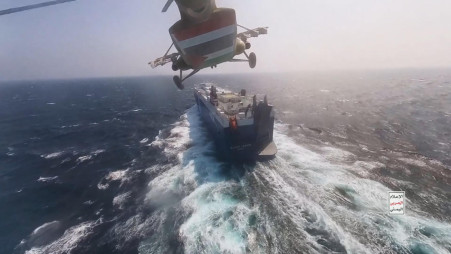What Houthi Red Sea attacks mean for global trade
Western governments wary of the potential economic damage if the Houthis manage to make it a no-go area were scrambling to come up with a response

A spate of missile strikes on ships plying the Red Sea has disrupted one of the world's busiest trade routes and sent energy prices higher.
The attacks are the work of Yemen's Iran-backed Houthi rebels, who say they are targeting any vessel with links to Israel to protest against its military campaign in Gaza. Western governments wary of the potential economic damage if the Houthis manage to make it a no-go area were scrambling to come up with a response.
1. How bad is the situation?
While this isn't the first time the Houthis have attacked ships passing through the Red Sea, they've never targeted tankers and cargo vessels this frequently. The rebels have fired missiles and tried to board and take control of some of the ships, largely without success. Some have been damaged but none have yet been sunk and there were no reports of major injuries for now. Many of the attacks are launched from near the Bab al-Mandab strait that ships pass through to enter the Red Sea from the Indian Ocean. The Houthis managed to capture an Israeli-owned car carrier called the Galaxy Leader in November, and it's become a sight-seeing attraction at the Yemeni port of Hodeidah.
Amid an increase in attacks by Iran-backed Houthi militants, oil tankers are idling and container vessels are rerouting around Africa in order to avoid waters off the coast of Yemen — an unavoidable waypoint for ships using the Suez Canal to cut between Europe and Asia. Bloomberg's Alaric Nightingale reports.
2. Why are the Houthis doing this?
Houthi leaders say they've mounted the attacks to support the Palestinians. They began firing drones and missiles toward Israel soon after the Gaza conflict began in early October and then moved on to targeting ships with Israeli ownership or those heading to the country. Yet some of those attacked in recent days have no obvious links to Israel, and container and tanker companies are concerned that all vessels are now vulnerable. The Houthis have said they won't back down until Israel ends its military offensive.
3. What's the immediate impact?
Companies including container shipping giant A.P. Moller-Maersk A/S stopped using the Red Sea route and sent its ships on arduous detours around the coast of Africa, adding weeks to journey times. When oil and gas major BP Plc announced a temporary halt of Red Sea travel on Dec. 18, Europe's headline natural gas price surged by as much as 13%, before retreating the following day. The spike signaled market fears that energy flows could be disrupted at a time when Europe increasingly depends on tanker-borne gas to replace once crucial Russian pipeline gas. There's evidence that shipping fees and insurance costs are also on the rise.
4. What's the effect on oil prices?
Oil's gain was less pronounced than for gas but has held up. Western sanctions on Russia have turned the Red Sea into part of a vital trade artery for crude and fuel trades as Moscow is now selling the lion's share of its petroleum out to Asia.
Oil shipments passing through the Suez Canal and Red Sea have more than doubled since Russia invaded Ukraine
5. Why is the Red Sea so important to trade?
It's the only route to the Suez Canal, linking some of the world's biggest consumers of tradable goods in Europe with big suppliers in Asia. About 12% of global trade passes through the canal, representing 30% of all global container traffic, and over $1 trillion worth of goods per annum. About 80 million tons of grains transit the canal every year, with more than a third of that bound for China, according to Kpler analyst Ishan Bhanu. Around 7 million barrels a day of oil passes through Bab al-Mandab, according to Goldman Sachs Group Inc.
6. Who assures security for Red Sea shipping and how?
Some ships have their own armed security guards, who can fire on approaching vessels if they look hostile. There's also a maritime-protection coalition in place for the region. Called the Combined Maritime Forces, it includes the US, UK and Saudi Arabia. The US, which operates its Fifth Fleet out of Bahrain, announced a new force on Dec. 18 that would come under the CMF, but few details have been worked out yet. US and other Western warships have responded to multiple distress calls from commercial vessels in or near the Red Sea, helping them repel Houthi attacks. Those countries and the Saudis have also downed some Houthi missiles. But there are splits over whether to take military action against the Houthis or use diplomatic means to try to persuade them to stop.
7. Could this spark a supply chain crisis?
While there's some slack in global supply lines to smooth out the impact of disruption to Red Sea traffic, the Covid-19 pandemic demonstrated how fragile networks are when major links break down for longer. When the Ever Given container ship got stuck in the Suez Canal in 2021, it halted traffic for less than a week but it took several months to get international supply chains running smoothly again. And there's no immediate prospect of an end to the Houthi attacks.



 Keep updated, follow The Business Standard's Google news channel
Keep updated, follow The Business Standard's Google news channel















